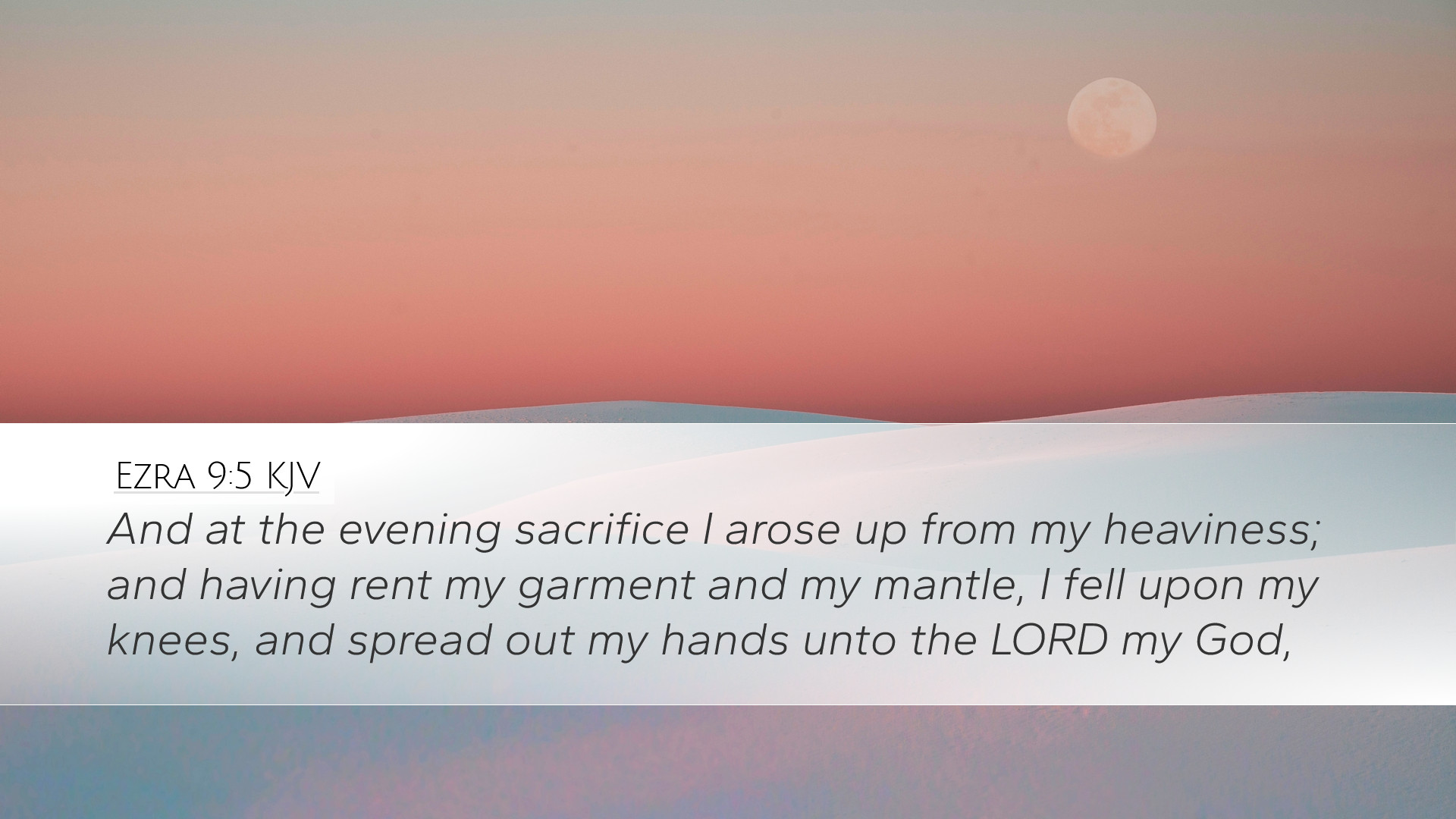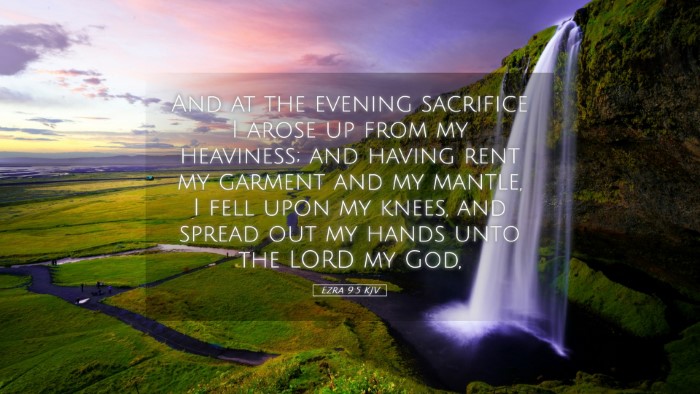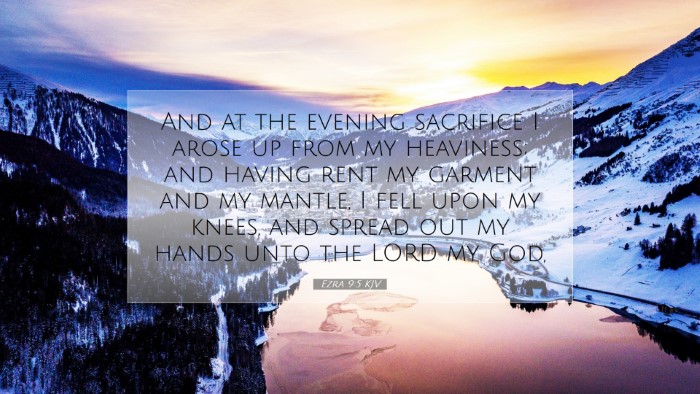Old Testament
Genesis Exodus Leviticus Numbers Deuteronomy Joshua Judges Ruth 1 Samuel 2 Samuel 1 Kings 2 Kings 1 Chronicles 2 Chronicles Ezra Nehemiah Esther Job Psalms Proverbs Ecclesiastes Song of Solomon Isaiah Jeremiah Lamentations Ezekiel Daniel Hosea Joel Amos Obadiah Jonah Micah Nahum Habakkuk Zephaniah Haggai Zechariah MalachiEzra 9:5
Ezra 9:5 KJV
And at the evening sacrifice I arose up from my heaviness; and having rent my garment and my mantle, I fell upon my knees, and spread out my hands unto the LORD my God,
Ezra 9:5 Bible Commentary
Commentary on Ezra 9:5
Ezra 9:5 reads: "And at the evening sacrifice, I arose up from my heaviness; and having rent my garment and my mantle, I fell upon my knees, and spread out my hands unto the Lord my God." This verse provides rich material for theological reflection and practical application. Below is a synthesis of insights from well-respected public domain commentaries, particularly those by Matthew Henry, Albert Barnes, and Adam Clarke.
Contextual Overview
The setting of Ezra 9 is critical for understanding this verse. The Jews had returned from Babylonian exile, and Ezra was appointed as a priest and scribe to restore both spiritual and social order among the people. Ezra's concerns include the intermarriage of the Jewish people with surrounding nations, which posed a threat to the purity of worship and identity. This backdrop elevates the importance of his prayer and actions.
Thematic Insights
1. The Evening Sacrifice
Ezra's Timing: The mention of the evening sacrifice holds profound significance. According to Matthew Henry, Ezra’s choice to pray at this specific time reflects a commitment to the prescribed worship of God, echoing the sentiments of the Levitical order. This suggests a deep sense of reverence and acknowledgment of God’s holiness.
2. Emotional State of Ezra
Heaviness of Heart: The term "heaviness" highlights Ezra's emotional turmoil. Albert Barnes explains that this heaviness was not only due to the sins of the people but also the recognition of their past and present failures before God. Ezra expresses a profound sadness stemming from a deep sense of responsibility for the spiritual state of the community, indicating that true leadership requires acknowledging and mourning over the sin of others.
3. Actions of Mourning
Rending of Garments: The act of tearing his garments symbolizes deep mourning and contrition. Adam Clarke elaborates that this tradition reflects an outward demonstration of inner grief, signaling the seriousness with which Ezra viewed the sin of intermarriage. In Jewish culture, such actions were emblematic of repentance and a cry for God’s mercy.
4. Posture of Prayer
Falling on Knees: Ezra's physical posture—falling on his knees—illustrates humility before God. This is a powerful reminder that prayer is more than words; it encompasses the heart attitude of submission and dependence on God. Matthew Henry notes that kneeling conveys an acknowledgment of God's sovereignty and a call for divine intervention.
5. Outstretched Hands
Symbol of Surrender: Spreading out his hands toward God signifies both a posture of supplication and an appeal for grace. Albert Barnes remarks that this signifies a total surrender to God’s will and a desperate need for His mercy. Outstretched hands in prayer can also be understood as a request for blessing and an invitation for God to act in a troubled situation.
Theological Reflections
This verse encapsulates foundational elements of biblical spirituality: recognition of sin, heartfelt repentance, and the earnest seeking of God. Each element is essential for a community desiring restoration.
1. Recognition of Sin
The Importance of Confession: Ezra’s lamentation serves as a poignant reminder that recognition of sin is the first step toward renewal. The New Testament echoes this in 1 John 1:9, where confession leads to forgiveness. Likewise, when communities fail to confront sin, they risk spiritual stagnation.
2. The Role of Leadership
Modeling Humility and Repentance: Ezra exemplifies the role of a spiritual leader who bears the burdens of the community. Unlike mere administrators, effective leaders lead by example in humility and contrition. Matthew Henry emphasizes that leaders must not only guide with wisdom but also acknowledge their failings and those of the people they shepherd.
3. The Nature of Prayer
Prayer as a Deeply Relational Act: Ezra's prayer illustrates that prayer is a relational interaction with God, characterized by earnestness and vulnerability. Prayer is not formulaic but a heartfelt conversation that aligns the supplicant's heart with God's will. Adam Clarke points out that such sincerity is vital for effective prayer.
4. Divine Mercy and Restoration
Hope in God's Grace: The verse hints at the central theme of God’s desire to restore His people. In the face of sin, He remains a God of grace continually extending mercy to the repentant. This interplay between human sin and divine mercy is a recurring theme throughout the Scriptures.
Practical Applications
The insights gleaned from Ezra 9:5 can serve to guide pastors, theologians, and students in contemporary contexts:
- Encourage Confession: Create spaces within the church for confession and corporate repentance, recognizing that spiritual health often begins with acknowledging failures before God.
- Model Vulnerability: Leaders should be transparent about their struggles, reflecting the authenticity seen in Ezra’s response to sin. Vulnerability fosters trust within the community and invites others to do the same.
- Emphasize Prayer: Teach about the power of prayer as an active expression of faith and dependence on God, encouraging congregants to adopt postures that reflect their sincerity in prayer.
- Focus on Restoration: Equip church members with the biblical understanding that no one is beyond God’s redeeming love. This message of hope can transform lives and foster healing within the community.
Conclusion
Ezra 9:5 stands as a profound testament to the power of intercession, heartfelt repentance, and the necessity of spiritual leadership. As we reflect on this passage, may we be inspired to approach God with the same earnestness, seeking grace and restoration for ourselves and our communities.


